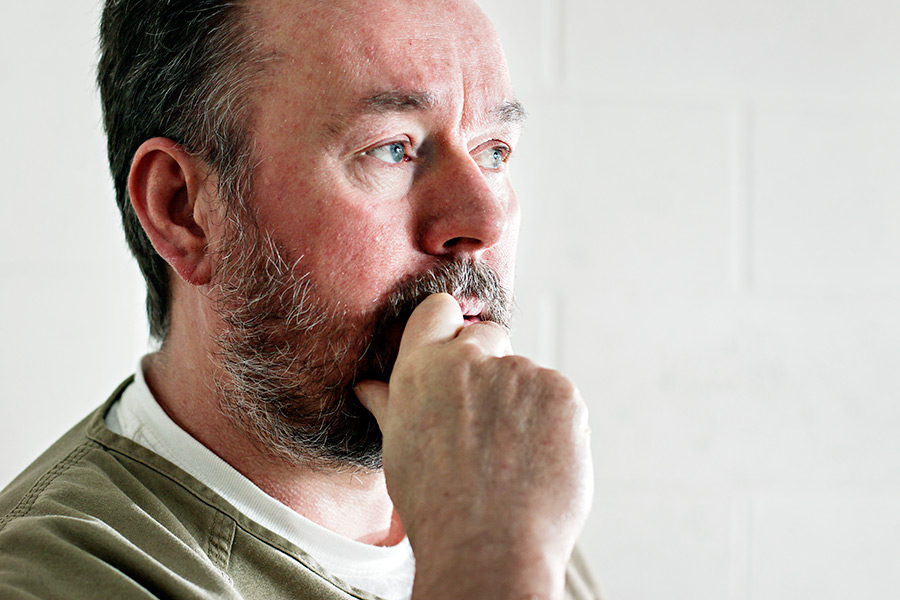Bail Hearing Set Following Trout Creek Man’s Overturned Murder Conviction
Attorneys representing Richard Raugust will argue for his release from the Montana State Prison Dec. 4 pending a new trial
By Tristan Scott
Incarcerated since 1997 for the murder of his best friend, Richard Raugust and his legal team will have the opportunity next month to argue for his release from the Montana State Prison pending a new trial.
Raugust, 49, who has never used a cell phone or accessed the Internet because he’s serving life in prison for a murder he swears he didn’t commit, recently saw his conviction overturned after steadfastly maintaining his innocence from the moment he learned that his friend, Joe Tash, had been shot dead near Trout Creek.
The request for the bail hearing came immediately on the heels of a Nov. 16 decision by Sanders County District Judge James Wheelis, who granted Raugust’s petition for post-conviction relief and, in doing so, set the stage for a new trial and the opportunity for Raugust to present newly discovered evidence to support his alibi that he was not present the night of the murder.
In the order, Wheelis concluded that the evidence shows prosecutors violated Raugust’s constitutional due process rights when they failed to disclose key findings that supported his alibi, and held up his claims of innocence and the theory that he was framed.
The bond hearing is slated for Dec. 4 at 10 a.m. at the Sanders County Courthouse in Thompson Falls.
“The court concludes that reversing [Raugust’s] conviction and granting him a new trial is the only remedy for the violation of his rights,” Wheelis wrote.
Since the morning of his arrest, Raugust has insisted that he did not murder Tash, whose body was discovered July 24, 1997, inside a camper trailer near Trout Creek. A Sanders County jury handed down a guilty verdict in March 1998 after sitting deadlocked for 10 hours, and Raugust was handed a life sentence.
In the years since, he’s made numerous attempts to appeal the conviction, failing at every turn due to procedural violations. In 2012, the Montana Innocence Project appealed Raugust’s conviction, saying that new evidence implicates another killer, and that if Raugust were granted a new trial, a jury would agree.
The new evidence challenges key testimony provided by the state’s sole eyewitness, a man the Montana Innocence Project asserts is the true killer. The defense team also contend that the testimony of a sheriff’s deputy, Wayne Abbey, would have supported Raugust’s alibi that he was not at the scene of the murder, but it was never divulged prior to trial.
According to Wheelis’ order, the deputy’s observations on the eve of the murder “put the entire case against [Raugust] in such a different light as to undermine confidence in the verdict at the underlying trial.”
Brett Schandelson, an attorney representing Raugust in his quest for relief, said the order was a triumph of justice.
“This is huge,” Schandelson said. “It’s hard to describe the excitement that I and the rest of the team is feeling right now.”
Schandelson said the defense team is awaiting a motion from the state as prosecutors decide whether to appeal the judge’s order.
With the conviction overturned, Schandelson will argue next month that Raugust is eligible for release on bail pending a new murder trial.
“We certainly hope that he would be released under some conditions while he awaits his new trial,” Schandelson said.
At the center of the Innocence Project’s case for a new trial is Raugust’s alibi, which the legal team says is supported by newly discovered evidence, and that the only testimony undermining it at trial was that of Rory Ross, the man they say is the true killer, and Rick Scarborough, at whose home Raugust says he slept.
One critical piece of testimony that supports Raugust’s alibi is that of Abbey, the deputy, who performed a bar check at the Naughty Pine Saloon in Trout Creek around closing time on the morning of the murder and encountered Tash, Ross, Raugust, and a man named Randy Fisher.
Abbey said he was in the bar visiting with the owner and saw Ross’ AMC Eagle across the street parked alongside Fisher’s car. He wondered what the men were up to, and then returned to his coffee and conversation.
In later interviews with investigators and attorneys from the Innocence Project, Abbey said he glanced out the window again and saw Ross’ car stop briefly about 200 yards down the highway. He watched as the brake lights came on and the dome light illuminated before Ross again sped off.
Attorneys for Raugust says it’s a key piece of evidence supporting his alibi that he hopped out of Ross’ car after second thoughts about a late-night party; knowing he had an early work commitment, Raugust says he opted to stay closer to town, and crashed at nearby Scarborough’s, where he’d stayed occasionally in recent weeks.